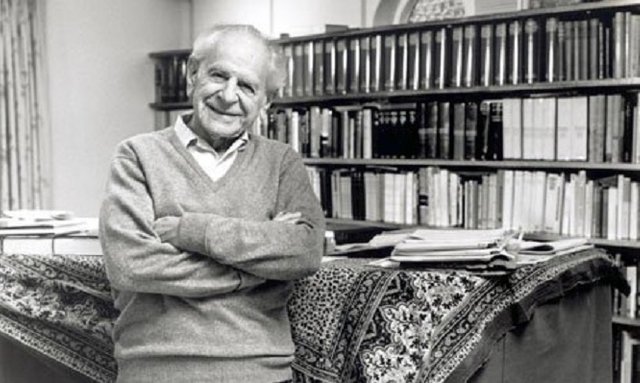Karl Popper and the Democratic Society and abut the tools and sources of power by John Galbraith
Karl Popper - The "Open" or Democratic Society
Closed society is generic, tribal, collectivist, anti-idealized, depressing every free initiative, "armored" for "foreign" influences and deprived of free movement of ideas and traditions. Popper has sketched both approaches ("Utopian Engineering" and "Stage or Partial Engineer") in Nineteenth "Aesthetics, Perfectionism, Utopism" he says that Plato's approach is called Utopian engineering difference from other types of social engineering, which he consider to be only resonable and what we can call phased / partial / engineering. Institutions are an inevitable result of a compromise with circumstances, interests, etc., though as individuals we must fight against such effects.
The Open Society, according to Popper, is a society in which people face the responsibility of their personal decisions. The people who represent this transition are Democritus, Protagor, and, of course, "the great leader of democracy Pericles." He formulates the principle of equality before the law and the principle of political individualism. His famous burial speech (quoted by Thucydides) praise Athens, it expresses, according to Popper, "the true spirit of the great generation," and is a political program of a great egalitarian individualist, a democrat who understands well that democracy is not exhausted by the idle words of "power of the people" It is based on the belief in reason and humanity . Some words of this speech that we consider the one who does not care about the state, not for harmless, but for useless, and although few can make a policy, everyone is in a position to judge it. Under democracy, Popper understands not as indefinite as "power of the people," or "power of the majority," but a system of institutes that allows public control of the government and its change at the will of the ruled, and enables the latter to achieve reforms without violence, even against the will of the ruling. It turns out that democracy is not just a synonym for nonviolence (as Popper says) that it still allows, even in some cases, violence.
John Galbraith - Tools and Sources of Power
Although much of the power exercised is concealed by manipulating public opinion, taken by itself, power is an inappropriate object of indignation. The aim of Galbraith 's research is to reveal the common facts behind the usual references to economic, political, military, religious, information, ideological power. And he identifies these constant magnitudes in the instruments and sources of power. According to Galbraith , there are three instruments of exercising power - forcing, compensatory and conditional power. Forced power is subjected to the threat of physical violence or threat of personal or public reproach, which is unwanted. Compensatory power achieves submission by proposing a positive remuneration by providing something valuable to the subordinate individual. Conditional power achieves obedience by changing people's opinions. Behind the three power tools are three sources of power - leadership, ownership, and organization. Leadership. In modern society, the most significant for the personality is its relation to the conditional power. Access to power depends on the ability to persuade, cultivate faith, impart confidence, to exercise a leader. Ownership. Among the three sources of power, ownership provides the most direct way to achieve it. Ownership gives access to the most common form of exercise of power - subjugating one's will through direct pay. Organization. It is the most important source of power in modern societies. It is assumed that the realization of the desired or necessary power effect is impossible without the organization. There are different types of organization: 1) Army, 2) Political party, 3) Corporation, 4) Government. Three features of the organization as a source of power can be highlighted: 1) Bimodal symmetry between internal and external power, 2) The organization's relationship with other sources of power and access to the three instruments of power, 3) Concentration or diversity the organization's goals. Like the instruments of imposing and exercising power, the three major sources of power are almost always in combination

You have recieved a free upvote from minnowpond, Send 0.1 -> 2 SBD with your post url as the memo to recieve an upvote from up to 100 accounts!
To listen to the audio version of this article click on the play image.

Brought to you by @tts. If you find it useful please consider upvoting this reply.
Curated for #informationwar (by @truthforce)
Our purpose is to encourage posts discussing Information War, Propaganda, Disinformation and other false narratives. We currently have over 7,500 Steem Power and 20+ people following the curation trail to support our mission.
Join our discord and chat with 150+ fellow Informationwar Activists.
Connect with fellow Informationwar writers in our Roll Call! InformationWar - Contributing Writers/Supporters: Roll Call Pt 8
Ways you can help the @informationwar